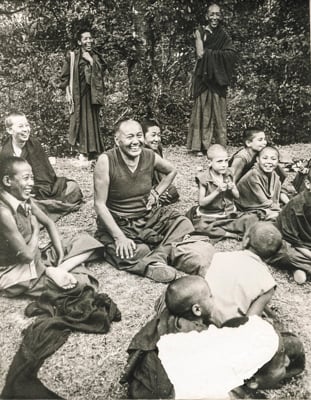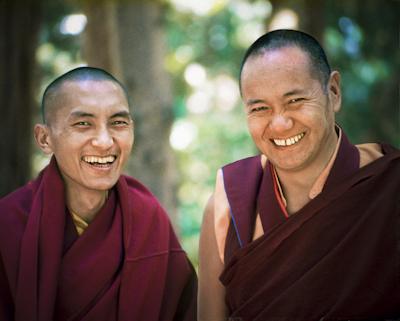Dear Friends,
Thank you for being on our e-letter list. Please feel free to forward these letters to your friends and ask them to sign up for them. We’d welcome more readers. This month’s teaching follows.
And thank you, too, to all of you who joined us in reciting the Sanghata Sutra as requested by our precious spiritual director, Lama Zopa Rinpoche.
More than 200 LYWA supporters participated in this Dharma adventure and we way surpassed our goal of 150 recitations: about 430! Thank you so much.
Here (lightly edited) are some excerpts of what some of you said about the experience:
“This is to let you know I have chanted one complete Arya Sanghata Sutra. I found it touching and interesting that my three cats sat around me until I was finished chanting it (it’s long!).”
“While I was sitting on the ground waiting for my bus, I was visited twice by a little yellow spider, a green leafhopper, and one of the tiniest bugs of a yellowish green I had ever seen. I thought that Dharma readings can reach even the tiniest form of life! That made my heart very warm and full. Also, I was so energized throughout the first weekend of this month. I was full, if I can put it into words. It is a wonderful sutra and I will definitely read it as many times as I can.”
“I’ve just had the extraordinary experience of reciting the Sanghata Sutra, dedicated with much gratitude to the Lama Yeshe Wisdom Archive and its work.”
“Thank you so much for giving me this opportunity to recite the Sutra. I had a very touching and spiritual experience when I was reciting it. With much gratitude and thankfulness….”
“I have completed, with joy, 2 recitations of this extraordinary sutra….”
“I have completed one full recitation of the Arya Sanghata Sutra. I am blessed to have had this opportunity.”
“I did have a good experience, though tiring at times. It is like filling up gaps that should have been filled up earlier on. It is interesting to imagine others than yourself listening to it during the recitation. Without your request, I probably wouldn’t have come across the Sanghata Sutra, much less read or recited it. I have never recited a sutra in full before or in that many repetitions. I have underestimated the recitation of sutra. Recitation definitely leaves a deeper imprint of the contents on the mind than reading it silently.”
“My horizons have been broadened by reading this sutra.”
“It was quite wonderful, with a lovely sense of light and blessings surrounding me. I recited it outside so as to benefit more beings.”
“After I did the Sutra this morning, I left for a job interview. I have been applying for jobs for a couple of months now, sending about ten posted applications, various email applications and cold calling dropping off my résumé. Well, I got the job that I was being interviewed for. When I left the interview, I turned on my mobile phone and there was a message for another interview. I went to that interview and it sounded very positive, they will let me know. When I walked out of that one, a message for another interview!! Is this a result from the practice?”
“This is to let you know that I finished the recitation of the Sanghata Sutra this evening. Believe me, the pleasure was all mine (though I dedicate it to others)! I often found myself crying during the reading…I really don’t know why…and I must admit there is much wording in these pages I don’t understand. But it was wonderful all the same.”
“I felt that by reciting it I started to understand reality more than ever. I enjoy it very much. It makes my life easier.”
“Thank you for this wonderful opportunity. I have read sutras, but never recited them in this way before. It is a powerful experience!”
“I am very happy to report that I was gratefully able to complete one recitation aloud of the Sanghata Sutra Dharma-Paryaya this morning and dedicated the merit as you advised in the newsletter. Thank you for this opportunity to be introduced to and to recite this deeply wondrous sutra on behalf of the Archive.”
“I have just finished my five Sanghata Sutras! What a joy it was to do. I hope all is well with you, Lama, and the FPMT. I might keep doing them, unless there is something else our Lama would prefer.”
“So far I have done one and a half recitations of the Sanghata Sutra and have found it quite amazing.”
“Please thank Rinpoche for his great kindness in requesting the recitations.”
“It is my honor to be associated with such a project.”
“I wanted to thank you for making the Sanghata Sutra available to me. I also wanted to thank you for the opportunity to help out with the Archive.”
“This was a very positive experience. It reminded me of the time, long ago, when I read the Buddha’s words; it created a feeling of familiarity and joy.”
“What an amazingly quick two weeks that was!! With hopes all flourishes endlessly...I think I will just continue on reciting and reciting!”
“It was very beneficial and I ask you send thanks to Lama Zopa for the inspiration of asking us to recite the Sutra. Otherwise I would never have found or read this myself. Nor would my dog, cat, and son, numberless beings in and around my home, or the fishes in the lake, the geese, ducks, turtles or the other beings without number in Montana have heard this sutra.”
“I have just done one recitation this morning, and dedicated as you suggested. It seems to be of profound benefit.”
“Thank for this precious opportunity to know this sutra.”
“My dogs listened attentively all the way to the end, from start to finish, in one sitting! They rarely stay in one place for that length of time.”
“What an incredible teaching!”
“The recitation provided me with calm peaceful sleep and inner peace upon waking the following morning—many blessings to you, your staff, Lama Zopa Rinpoche, and all others who had a part in bringing this precious text to sentient beings.”
“I feel the Buddha power when reciting the Sutra, it is very intense. I finished reciting it once and plan to do more.”
“I was thrilled to participate, thank you.”
“I have done one recitation of the Sanghata Sutra. Wow, it was great! I hope to do more.”
“How wonderful of our precious teacher Lama Zopa Rinpoche to let us meet and recite the Sutra.”
“I can’t thank you enough for sharing this teaching with all of us, not to mention the other wonderful teachings that have been shared.”
So, dear LYWA supporters, it is we who have to thank you for so kindly accepting our request to do these recitations. I am happy that it was a positive experience for you and suggest that you keep on reciting it whenever you like.
Oh, and for those who asked, a yojana (Tib: pak-tse) is an ancient Indian unit of length, 4,000 arm spans, or about 8,000 yards, and a koti is ten million!
Much love,
Nick Ribush
Director
Walking and Chewing Gum: Doing Two Things at Once
Lama Yeshe
 In Lord Buddha’s Mahayana tradition, we always emphasize the great importance of uniting method and wisdom in order to attain the highest realization of enlightenment. If you have only wisdom but not method, it’s impossible to realize totality. Even in our daily lives we need both method and wisdom to keep our lives together. Without method, our daily lives reflect mental disorder. Intelligence alone is not enough.
In Lord Buddha’s Mahayana tradition, we always emphasize the great importance of uniting method and wisdom in order to attain the highest realization of enlightenment. If you have only wisdom but not method, it’s impossible to realize totality. Even in our daily lives we need both method and wisdom to keep our lives together. Without method, our daily lives reflect mental disorder. Intelligence alone is not enough.
It’s important to be realistic and keep your lifestyle together. With intelligence, you can see what has to be done, but laziness and inaction prevent you from doing it. This is an example of a lack of method. Your wisdom can see what to do but you can’t put it into action. This brings problems into your life. Instead of being orderly, harmonious and integrated, your life is disorderly, disjointed and fragmented.
Keeping your lifestyle together does not mean being rich, having a car and being materially well off in general. That’s not what it signifies. It means that even if you have very few possessions, your room is tidy and comfortable—if you have just a few things and they are all over the place, the disorder reflects in your mind. Therefore, it’s important to keep things together. This is just a simple example but it’s applicable to your Dharma practice. For inner development, to find liberation, you have to practice method and wisdom together.
Many times I hear Dharma practitioners blame their problems on their Dharma practice and complain that their Dharma practice does not help them. It’s almost as if they’re criticizing Dharma. When they get depressed, they question and criticize Dharma and have doubts about continuing their practice. The problem is not Dharma; the problem is that these people are confused. They don’t know what Dharma is. That’s why it doesn’t help.
When we explain Dharma, we don’t say that it’s a material object. We don’t say the dorje and bell are Dharma. If we did, then perhaps you could have doubts about how helpful it is for you. Thinking of Dharma in material terms is a misconception, but unfortunately it’s fairly common.
Other people feel that their meditation doesn’t help them. If that’s how you feel, check how you’re meditating. The thing is, no matter what you do, your experience is personal and unique. Don’t put meditation up there while you’re down here and then complain that it doesn’t help like it used to. It doesn’t help because you’ve created a gap between yourself and your meditation. The point I’m trying to make is that you must practice method and wisdom together.
You must also understand that the way method and wisdom are practiced in Paramitayana is very different from the way they’re practiced in Tantrayana. If it were the same for both vehicles, tantra would be no faster or more powerful than sutra. Tantrayana and Paramitayana would then be the same.
In Paramitayana practice, the way method and wisdom are practiced together is alternately. Sometimes your consciousness is wisdom; at other times it’s method. They are two different things. In tantric yoga, method and wisdom occur together in the same consciousness. This is difficult to explain and takes time to understand, but gradually you’ll manage.
It’s more difficult to put two things into the one space at the same time than to put them in two different spaces, so putting method and wisdom simultaneously into the one consciousness is also difficult. It’s hard for the unintelligent mind to comprehend two things at once. The simple mind can comprehend two things one at a time but not both together. As we often say, “Tell me one thing at a time,” or “I can’t do two things at once.” Therefore, if you want to practice tantric yoga, it means you’re saying, “I’m intelligent enough to do two things at once.”
Lama Yeshe gave this teaching at Manjushri Institute, England, in July 1977. Edited from the Lama Yeshe Wisdom Archive by Nicholas Ribush.





























